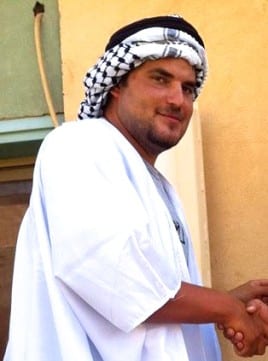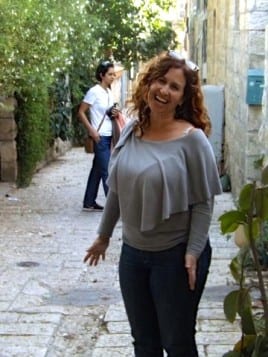
It is with great sadness that I also use this month’s blog to announce the departure from the Institute of Michelle Shachar, the founder of the Peace Building and Environmental Leadership Seminar. When Michelle came to the Institute 15 years ago, she immediately recognized the need for the diverse group of Arava Institute students to have a safe space to discuss the emotionally charged baggage that each one brought with them from their home and to learn the skills needed to express these emotions in a constructive way. With her strong background in cross-cultural psychology and inter-intra group dialogue, Michelle worked with other staff members to create the Peace Building and Environmental Leadership Seminar (PELS), the Arava Institute’s flagship dialogue program. After 15 years of dedicated service to the Arava Institute, Michelle has decided to leave her position at the Institute. Michelle’s contribution to the Arava Institute is immeasurable. Many of our accomplishments as the leading trans-boundary environmental studies program in the Middle East can be attributed to the safe space created by our unique approach to campus life and cross cultural dialogue engendered in PELS. The PELS program will continue building on the strong foundation which Michelle has left us but will also respond to new students, new staff, new ideas and new directions. We will always be grateful to Michelle for her tireless commitment to the mission of the Arava Institute and wish her the best of luck in her future endeavors. This blog is a tribute to Michelle’s tireless efforts
David Lehrer
The Arava Institute says goodbye and thanks to Michelle Shachar, founder of the Peace Building and Environmental Leadership Seminar (PELS)
Michelle Shachar moved to Kibbutz Ketura 20 years ago and began working at the Arava Institute in 1999, three years after it was founded. She accepted the position of Director of Student Affairs (later renamed Director of Student Life) on the condition that she could create a coexistence dialogue program. Using her extensive background in cross-cultural psychology and inter-intra group dialogue, and combined with her inexhaustible energy, Michelle designed, organized, and facilitated all coexistence programming at the Institute until stepping down in July 2014.
These coexistence dialogue programs have proven to be invaluable for the unique mixed community living and studying together at the Institute. In addition to the Peace-building and Environmental Leadership Seminar, Michelle has lead a number of coexistence programs at the Institute. These programs have included the Cultural Dialogue Series, the Coexistence and Leadership Seminar, Environmental Leadership, Current Affairs and Practicing Peace. She was Director of Student Life until 2010, and was also responsible for logistics of Academic field trips and Short Programs, organizing a number of group programs and internships. She continued to coordinate PELS through the Spring 2014 semester.
In 2012, Michelle began studying for her Masters in Conflict Resolution at Ben-Gurion University of the Negev, where she created the “Shared Journey” peace education program in Eilat between African asylum seekers and Israelis — the first integration curriculum 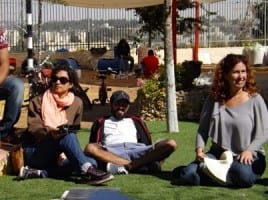
It is difficult to imagine a more demanding role at the Institute than that to which Michelle has dedicated 15 years of her life, all while continuing her education, organizing an outside program and managing her own family. Her contributions have made the program what it is and significantly impacted the lives of the students and interns who have participated in it. We asked alumni to tell us about their experiences in PELS especially in light of the current situation. The following submissions from alumni speak for themselves, reflecting a diverse range of individual experiences, as contextualized by the recent escalation of violence and fear in the region.
Maya Schkolne a Jewish alumna from South Africa
I did not leave PELS sessions feeling calm and contemplative. Rather, I walked out slowly because I was processing my rising bitterness for not having previously questioned enough. This resentment would translate into layered pain that would sometimes be smoothed over, sometimes stirred, through follow-up discussions with Arava friends. The demands in my mind would persist; why didn’t I ask my parents more about what it meant to be born on a kibbutz in the north between Arab villages? Why, when I was younger, was I silent and self-conscious during Jewish history classes when a friend would enquire, “but what about the Palestinian refugees?” Why, through the years at the youth movement that I was active in, did I not engage more deeply with the implications of left-wing Zionism? Throughout my life, I had keenly selected other difficult issues to pick apart — why not these ones? Perhaps it is because this process of learning, unlearning and coming to peace with a radically new framework of understanding invokes guilt and confusion and demands a jarring reframing of 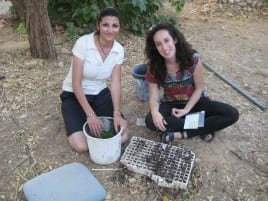
Throughout the build-up and expansion of the current crisis, the Jews and Israelis that I know that have been struggling for an end to the violence have been Arava alumni. They have not refrained from insisting that the violence is falling overwhelmingly on the backs of the Palestinians or that a just peace means genuine safety for all Jews and Arabs in the Middle East. This stands in contrast to other Jews and Israelis I know whose arguments have been laced with the kind of denial that I most likely would have clutched onto myself. Similarly, in South Africa I went to Gaza solidarity marches that employed hostile and anti-Semitic rhetoric, polluting the cause. I subsequently turned to Palestinian friends from the Arava who emphatically affirmed that they remembered being moved to tears in PELS after discussing the Holocaust and the ways that Jews were forced to flee other countries; that anti-Jewish hatred has no place; and that this is firmly a matter of human rights, not religion.
It goes without saying that these compassionate activists exist outside of the Arava. It also goes without saying, however, that PELS and the Arava experience shifts people’s thinking, and this translates into action. Dialogue at the Arava was neither feel-good, nor easy, and uncomfortable yet powerful dialogue is one of the many keys to moving the situation forward.
Submitted by Maya Schkolne
Suleiman Halasah, a Jordanian alumnus from Amman who came back to the Institute this year as an early stage researcher
Since I began studying at the Arava Institute, 7 years ago, I have heard students complain about “that course”. Many students contended that they were here to study about the environment and 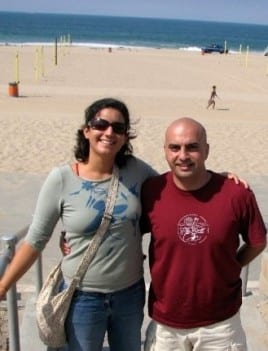
I was part of PELS as a student, a program associate (PA) and as an active member of the alumni network, PELS is the common language that we all talk. As hard and complex as the situation is in the Middle East these days, this does not stop us from talking and listening to each other. By applying the skills we learn in PELS we can understand where the other side is coming from and empathize with each others tragedies. We can also use the frustration and anger towards the current situation in order to move forward and keep trying to make a difference.
I knew Michelle for these 7 years, I worked with her in class preparation during my term as a PA, knowing the amount of energy and efforts she put in to making PELS happen; because of these efforts we have such a great alumni family. Thank you Michelle!
Submitted by Suleiman Halasah
Liel Maghen a Jewish alumnus from Israel
When people speak about 1929 or the 1940’s, they usually speak about the violent actions that took place in those years. However, we tend to forget that many people were saved during that time thanks to people from the other side who acted differently than those around them, and saw the world through a different lens.
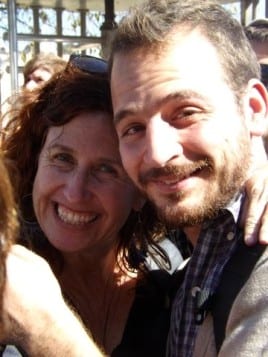
For me, PELS is an attempt to create a different language. It tries to create new words, to form new behavior according to opposite values, and to create trust between conflicting sides. By these actions, it aims to show that there is an alternative to violence and there is another way of confronting reality.
Of course, this goal maybe too ambitious and can be criticized because it ignores current events or avoids facing reality. But throughout this current round 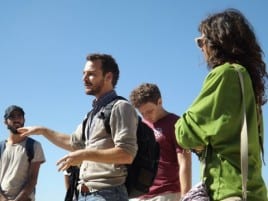
As we are living in a time of escalating violence, this new perception isn’t just a slogan or an academic exercise. Throughout history we learn that the alternative to violence saved lives. When time passes, the people that found an alternative to violence are considered heroes.
Submitted by Liel Maghen
Alaa Obeid, a Palestinian alumna from East Jerusalem
On June 12th, 2014, 3 Israeli teenagers were kidnapped and murdered in the West Bank. Israel responded by launching a massive search in the Palestinian towns and villages of the West Bank. The spring semester 2014 ended on June 19th. Some of our Palestinian students could not return to their homes because the army had closed off towns in the West Bank. The Institute continued to host and support the students until they could get home. On June 30th, Naftali, Gilead and Eyal’s bodies were found. On July 2nd, Palestinian teenager, Mohammed Abu Khdeir was abducted and killed. The following personal account by Alaa Obeid, a student from last semester, is an honest reflection on her experience at the Institute in light of the difficult situation she faced coming home to Ramallah.
The semester at the Arava Institute ended and we left the kibbutz to go back home, back to reality — and what kind of reality did we find? One for which the past 4 months in Ketura did not prepare me. The kidnapping of the 3 teens, the Israeli Forces’ home raids in the West Bank and racist attacks on the street. The same night I arrived in Ramallah, Israeli Forces entered the city for the first time since the Second Intifada causing clashes with the residents and things escalated from there. Now the conflict and occupation have never been harsher.
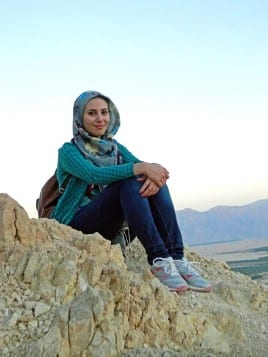
In PELS, there were good and bad sessions. It was not always clear to me what we achieved or if it had been done the right way. Was it right to relocate us from our unequal realities, to adjust our conditions and place us into a situation of equality? Was it right to put us in a better but fictional framework in order for us to feel safe and communicate as if we were equal? Why didn’t we talk about the current circumstances, about our different realities, instead of repeating the differences in our history?
At the end of the semester, I felt equal, I felt empowered to change, I felt I was a leader; I was ready to start my future with bigger hopes. However, the harsh reality slapped me in the face. The skills I had gained in PELS have no place in my current reality. I can’t practice them because there are gaps which need to be filled; there are basics that don’t exist within our societies. At this time, we cannot sit at the same table to work out our differences if one party is still occupied and the other is the occupier.
Submitted by Alaa Obeid
Sam Tell, a Jewish alumnus from the US now living in Haifa
In these dark times of war and hatred I think back to PELS with a sad nostalgia. I am sad because I see how valuable this program was to me and how important it is for every person in Israel and Palestine to have something like this. If everyone had PELS, no one would be chanting ‘Death to Arabs,’ or cheering when rockets and bombs caused injuries and deaths, because PELS allowed us to humanize the ‘other.’ Despite our disagreements, we were all able to see each other as sapient beings, the same as ourselves.
There are, however, many ‘encounter’ type programs that can serve this purpose. What made PELS special is that it refused to engage in normalization. We were always conscious of the power imbalance between the Israelis and the Palestinians. The occupation was ever-present, and while it made some of us uncomfortable, it was ultimately beneficial for all of us to face reality. We were not allowed to pretend that there are two equal sides here although there are certainly equal narratives and pain on both sides. I feel that this was the most important part of all. Michelle will be truly missed.
Submitted by Samuel Tell
Layla Hashweh, a Palestinian alumna from East Jerusalem
Two years ago, I made a major life-changing decision by enrolling in the Arava Institute. At that point in time, I did not know that the experience I was about to have or the people with whom I was about to engage would have such a remarkable impact on my life. As I sit here today in Sde Boker looking for words to describe the war in Gaza and the situation in Israel and Palestine, I am on the verge of losing faith in humanity and hope for peace altogether. Fortunately, my experiences at the Arava gives me a glimmer of light during dark times.
I try to remind myself of PELS, when Michelle ran after us in an attempt to convince us to go back to class. Back then, when there were challenging situations, my heart would race, and I would immediately and aggressively defend myself and my views. Poor Michelle, not only did she have to deal with my anger, anguish and frustration, but also that of thirty other students from different backgrounds and cultures. The most positive outcome of PELS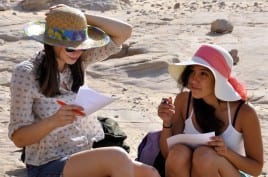
I believe in every one of you, my dear Arava Alumni! We are friends and even more, family! I want to extend my deep gratitude and appreciation to Michelle Shachar, without whom, PELS would not have been the eye-opening and powerful experience that it was.
Submitted by Layla Hashweh
On July 24th, during the height of the current conflict, 28 alumni and staff from the Middle East and around the world gathered on a conference call to talk about the situation, share their concerns and brainstorm constructive responses to the war. Alaa, Sam and Maya were among the alumni who participated on the call. After sharing their frustration, anger and feelings of helplessness, the alumni turned to the question of “what next?” A variety of ideas were raised including an attempt to reconnect with as many alumni as possible, the creation of a You Tube video site to share thoughts and concerns and regular conference calls to keep the lines of communication open. At the end of the call, Tamara Rejwan, the Alumni Coordinator reminded the participants of the next Arava Alumni Peace and Environmental Network Conference which will be held in January 2015.
I would like to thank Melanie Nakashian, my intern for creating this month’s very special blog.
Today is Tisha B’Av, the day the Jewish people remember the destruction of the Temple, the disasters that have befallen our people and the brokenness of the world. Many Jews fast on this day of mourning. Though I do not fast, I will use this day to reflect on the disasters that have befallen my people, human beings everywhere and especially the residents of Gaza. To those who are fasting – Tsom Kal (easy fast).
David Lehrer

